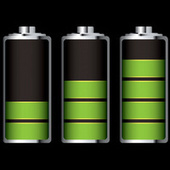
How Often Should I Charge My Gadget’s Battery to Prolong Its Lifespan?
There is a lot of confusion surrounding this issue, mostly because lithium-ion batteries are different from older, nickel-based batteries (which suffered from a nasty memory effect not present in lithium-ion batteries). You’re right, though—charging them incorrectly can decrease their lifespan. Most lithium batteries should last you a few years, but improper care can decrease that lifespan, meaning that your battery will be unable to hold a charge—or unable to hold as big a charge as it used to—quicker. So, to clear things up, here’s how to actually extend your battery’s health as much as possible.
Perform shallow discharges. Instead of discharging to 0% all the time, lithium-ion batteries do best when you discharge them for a little bit, then charge them for a little bit. The table at the right, from Battery University, shows that discharges to 50% are better for your battery’s long-term life than, say, small discharges to 90% or large discharges to 0% (since the 50% discharges provide the best number of cycles-to-usage ratio).
Don’t leave it fully charged. Similarly, lithium-ion batteries don’t need to be charged all the way to 100%. In fact, they’d prefer not to be—so the 40%-80% rule you heard is a good guideline. When possible, keep it in that range to prolong its life as long as you can. And, if you do charge it to 100%, don’t leave it plugged in. This is something most of us do, but it’s another thing that will degrade your battery’s health. If you need to charge it overnight, use something like the Belkin Conserve Socket to stop it from charging after it’s full.
See on lifehacker.com
RFID Blocking Wallet
There’s some seriously scary stuff out there in the world — from bird flu and terrorism to depleting our planet of natural resources. There’s not a lot that the average person can do about much of the things that may keep us up at night. Luckily, there’s one scary prospect on the horizon that we can help with — and it doesn’t require lining your pants with aluminum foil! Aren’t you lucky?Imagine if you will, some of these possible real-life scenarios:A shadowy character crouches unseen in the bushes. He doesn’t have a gun or a knife, but he has a laptop. He watches as his prey walks by. Invisible radio waves emitting from the credit-card in his wallet get picked up by the laptop, recorded, and saved onto a cloned card. For all intents and purposes, this man becomes you, and has decided to go shopping.Or maybe he picked up the passkey that lets you into your office building. With ease, he can now walk into your secure office building and steal your company’s equipment. The next morning, security guards are waiting in your cube to have a chat.The nightmare scenario was brought forth recently – a bomb lies waiting in a garbage can. Sensitive electronics read the identification cards and passports of the people who walk by, waiting until somebody of your nationality comes close…It’s a scary world out there. Credit card companies and governments are putting RFID chips in your cards and identification, sometimes without your knowledge. Protect yourself and your money with a wallet that specifically inhibits those radio frequencies from escaping until you pull your card out. Did we mention you don’t need to put foil in your pants? It’s important to us that you know that you do NOT have to put foil in your pants. Very important. No foil. In your pants… none… zip… nada.
Via www.thinkgeek.com
China censors ‘hit social media’
Chinese censors are actively targeting social media to quash discussion of banned topics, suggests research.The US study gives the most in-depth look at the extent of China’s policing of discussions on microblogging sites.Analysis of almost 60 million messages from China’s equivalent of Twitter suggested which topics were banned.It also revealed that China tuned its censoring activity to be more aggressive in places where political unrest was high.
Via www.bbc.co.uk
Google defends new privacy policy to Congress
Google has been facing a barrage of questions about changes it plans to make to its privacy policy that affects how it handles the voluminous data it collects from hundreds of millions of people around the globe.Some of those questions have come from members of Congress who question if Google is sacrificing its users to boost its online advertising business as it pushes into new areas such as social networking and mobile devices.The Internet search giant responded Tuesday in a letter, saying its new privacy policy helps users and is similar to those used by other Internet companies.Google said it was just making its privacy policy easier to understand and said it was already sharing information about its users across services.It also said the new privacy policy benefits users by helping them find the information they are looking for more quickly.
Via latimesblogs.latimes.com
Why Apple’s ‘New Textbook Experience’ Is Actually Revolutionary
It’s official: Apple has doubled down on education. In today’s announcement of its new iBooks 2 platform, the company also introduced iBooks Textbooks, iPad-based textbooks that it’s been developing, so far, in conjunction with textbook giants Pearson, McGraw-Hill, and Houghton Mifflin Harcourt. The collection of primers — which Apple is variously referring to as a “new textbook experience” and “the next chapter in learning” — leverages the interactive capabilities of the tablet and applies them to educational content.This is big news because it’s a big deal. In entering the textbook market, Apple is also transforming it.Textbooks have remained, depending on your perspective, either amazingly consistent or amazingly stagnant over the thousands of years they’ve been around. Whether codexes or scrolls, whether scrawled on papyrus or printed on paper, their purpose has remained the same: to contain and systematize the educational experience, making knowledge both portable and economical. Textbooks have been optimized to render the vagaries of circumstance irrelevant.
Via www.theatlantic.com
Yahoo CEO steps down: no surprise really
Jerry Yang is leaving Yahoo, the Internet company he helped start 17 years ago. He did not cite a reason. In a statement, Roy Bostock, Yahoo’s chairman, said Mr. Yang would immediately give up his board seat at Yahoo and step down from the boards of the Alibaba Group and Yahoo Japan.Mr. Yang did not give a reason for his departure, but it occurred as the company undergoes a strategic review under a new chief executive, Scott Thompson, on whether the company should sell off its Asian interests and focus on its media assets. Yahoo owns a 40 percent stake in Alibaba and a 35 percent stake in Yahoo Japan.
Via www.nytimes.com
A Publisher’s Perspective on Ebooks | American Libraries Magazine
It was a rainy afternoon just before Thanksgiving in 2007 when I stood on a New York City sidewalk clutching my first e-reading device. I had just come from Amazon’s press conference where Jeff Bezos announced the launch of Kindle, a new e-reader designed to wirelessly deliver book content directly to customers in as little as 30 seconds. The device used E Ink technology, which provided a more true-to-print reading experience and allowed for longer battery life. An e-reader could store hundreds of books and run for hours on a single charge, all without use of a computer. Paired with the vast book, newspaper, and magazine content that Amazon had amassed and the ease with which customers could access that content, many predicted that Kindle would forever change the print-media landscape.
Via americanlibrariesmagazine.org
Chinese writers sue Apple for allegedly hosting pirated ebooks | Macworld
A group of Chinese writers has filed a lawsuit against Apple, alleging that the company’s App Store sells pirated versions of the authors’ works.The lawsuit demands Apple compensate the writers for 11.9 million yuan ($1.88 million) and cease selling the products. Beijing Second Intermediate People’s Court has accepted the case, according to Bei Zhicheng, executive for the writer’s group.The lawsuit, filed on behalf of nine writers, involves 37 different literary works that have allegedly been sold as pirated copies on Apple’s App Store, which takes a 30 percent cut from app sales on the platform.The group began contacting Apple since last July, asking the company to remove the pirated products from the App Store. But Apple has refused to remove them, stating that the group did not provide enough evidence to confirm the works were unlicensed, according to Bei.
Via www.macworld.com
North Korea from 30,000 feet | Bulletin of the Atomic Scientists
The first publicly available overhead imagery that suggested North Korea was constructing a new nuclear reactor at its Yongbyon complex appeared on November 4, 2010. Charles L. Pritchard, a former special envoy for negotiations with North Korea and the president of the Korea Economic Institute, along with a delegation from the institute provided the first confirmation of this construction after a visit to Yongbyon that week. The following week, Yongbyon officials told PDF Stanford University’s John W. Lewis and two authors of this article (Hecker and Carlin) that the reactor was designed to be an experimental pressurized light water reactor (100 megawatts thermal, or 25-30 megawatts electric) to be fueled with low-enriched uranium fuel produced in a newly constructed centrifuge plant at the nearby Yongbyon fuel fabrication plant. The new reactor is being constructed on the former site of a cooling tower for a now-disabled, 5-megawatt electric, gas-cooled, graphite-moderated reactor that had been used to produce plutonium; the tower was demolished in 2008 as a step toward an eventual denuclearization agreement.
Via www.thebulletin.org









Recent Comments